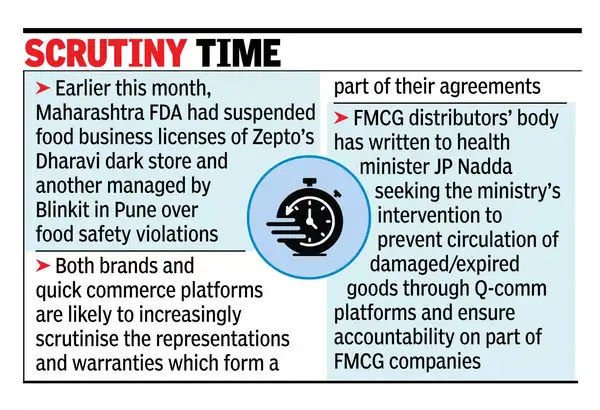MUMBAI: Following incidents of meals security violations at darkish shops operated by fast commerce platforms, manufacturers are renegotiating and tightening their phrases of contract with them to make sure that such cases are saved beneath examine. “Clauses associated to storage, dealing with and hygiene are being renegotiated, particularly within the context of darkish shops and last-mile supply…many are additionally maintaining authorized choices open notably the place negligent dealing with might set off shopper claims or regulatory scrutiny,” Chandan Goswami, associate at regulation agency AT & Companions advised TOI.Not less than half a dozen manufacturers together with Marico, ITC, Godrej Client Merchandise and Dabur declined to remark. Queries despatched to Zepto, Swiggy and Zomato-owned Blinkit didn’t elicit any responses. Earlier this month, the Maharashtra Meals & Drug Administration division had suspended meals enterprise licences of Zepto’s Dharavi darkish retailer and one other managed by Blinkit in Pune’s Balewadi space over meals security violations and regulatory non-compliance.

The licences have been reinstated following inspection by authorities and adherence to compliance by the platforms. Manufacturers are actually negotiating representations and warranties (as a part of the contract), asserting compliance with FSSAI norms and correct meals dealing with procedures. They’re additionally incorporating sturdy indemnity clauses to defend themselves from losses or reputational hurt arising from platform lapses in addition to looking for audit rights to get entry to darkish shops and fulfilment centres for verification, stated Dheeraj Nair, associate at JSA Advocates & Solicitors. “Fast commerce operators can now not be handled as mere facilitators; they’re more and more seen as co-custodians of regulated items. Manufacturers, in response, are revising contracts to power accountability via exact compliance requirements and authorized safeguards,” stated Nair. To make sure, the FSSAI e-commerce steerage and advisories require formal written agreements between model house owners and platforms affirming compliance with FSSAI rules, authorized specialists stated. The marketplace for fast commerce or 10-minute deliveries is quickly rising in India, notably within the metros the place, pressed for time, customers don’t thoughts paying a bit additional to get groceries and different merchandise delivered at their doorstep in minutes. The house has expanded to cowl a complete host of non-grocery classes together with toys, jewelry, electronics and choose attire. A current report by Kearney stated that the short commerce market is anticipated to triple between 2024 and 2027 touching Rs 1.5-1.7 lakh crore. Pursuant to current developments, each manufacturers and fast commerce platforms are prone to more and more scrutinise the representations and warranties which kind part of their agreements.This can guarantee requisite licences, together with these beneath the Meals Security and Requirements Act, 2006 have been obtained and maintained, stated Sahil Narang, associate at Khaitan & Co. “The main focus may also be on compliance protocols, particularly in relation to perishable items the place hygiene and storage requirements are essential,” Narang stated.

